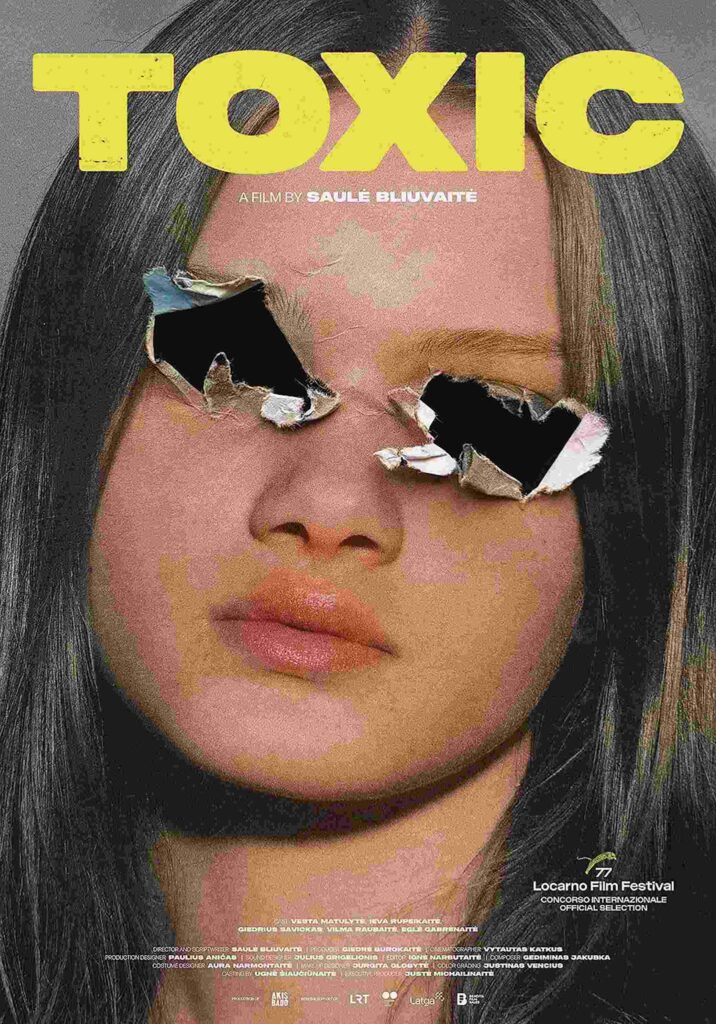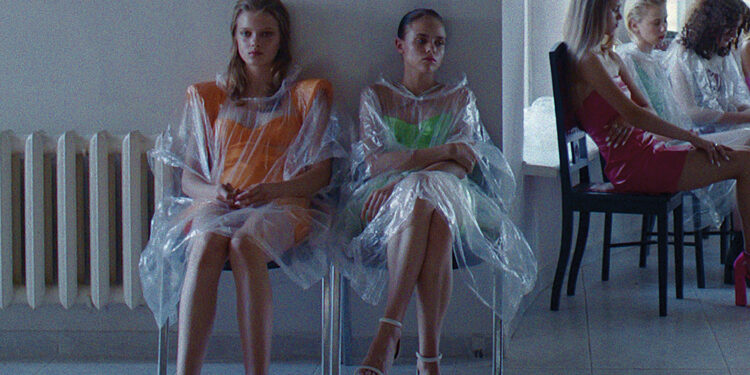Though Toxic is her first full-length feature, she had already made four short films before attaining a degree in film directing from the Lithuanian Academy of Music and Theatre (LMTA) in Vilnius in 2018. Students, and filmmakers more broadly, are beneficiaries of a generous national system of public funding for development and production.
“Lithuania will always be the place where you can get actual money to make films,” she says. “There’s less competition for funding here than in places like France or Germany, so this is a great place to start.”
Bliuvaitė is only five years’ younger than modelling superstar Vilkevičiūtė. Both women were raised in a newly independent Lithuania with an infant economy stumbling towards a semblance of market stability. The promise of a glamorous international career must have been incredibly alluring. “When I was 13 or 14, it was a different time in Lithuania. At that time, it was a bridge to the outside world, a career abroad where you can earn real money. There weren’t many opportunities where I lived,” Bliuvaitė says.
“When I was 18, one of my friends went to New York to be a model at nightclubs to attract clients, and she asked if I wanted to go. I was interested, and at that point, I hadn’t been anywhere abroad, so that was exciting for me. I sent pictures to an agency, which sent a contract, but it freaked me out. It was very shady, ultimately rejecting all responsibility for anything and everything that might happen [to me]. That was scary so I didn’t go.”
It was VERY SHADY, ultimately rejecting all responsibility for ANYTHING and EVERYTHING that might happen [to me].
Perhaps she dodged a bullet. At the time, Bliuvaitė was in her early teens and the major modelling scouts and agencies were establishing bases in Eastern Europe, with Lithuania, the Czech Republic, Estonia, Romania and Bulgaria their prime hunting spots for pale, skinny girls with sharp cheekbones, rangy limbs and a desperation to work as hard as they were told to.
An August 27, 1995 a Los Angeles Times story entitled “The New Supermodel Supermarket” profiled the scouts and agents hungrily sourcing young girls with the promise of runway careers, apartments in New York, travel and money. To this day, the story is cringeworthy: agents, bookers and scouts discussing girls barely out of their childhoods as commodities.
A decade ago, as the Times’ then Paris bureau chief Scott Kraft discovered, legitimate local modelling agencies in Eastern Europe were small and hidden among prostitution rings disguised as modelling agencies. “In the new capitalist free-for-all, hundreds, if not thousands, of guileless young women have been sent abroad for nefarious profit, and local newspapers in the east are filled with their sad stories of exploitation,” Kraft wrote.
Paris-based modelling scout Dominique Caffin discovered a teenage Eva Herzigová in Prague. “I think one finds more interesting faces in the east, and they bring something really new to the fashion world,” she told the Times. “But it is at a higher cost. In the east, you have to advance everything. The plane ticket. Meals. No one has any money.”
Bliuvaitė says: “As we were casting, which took two years in total, I talked with a lot of girls who had some experiences with modelling. With your body changing as a teenager, a lot of girls found it so hard to control those natural fluctuations in their bodies. Some girls were told if they wanted to get to an international level and work with fashion houses they’d have to submit to that incredibly thin shape.”
It was, and is, a world that the young filmmaker views with both compassion and sadness.
Those girls are basically CHILDREN put into WOMEN’S CLOTHES.
Bliuvaitė continues: “This obsession with modelling . . . agents scouting for very thin, pale girls was the thing to do [in the late ’90s and early ’00s]. It was popular to sign very, very young girls – 13 or 14 [years old]. That was the weirdest thing, and that’s what interested me in this story. Those girls are basically children put into women’s clothes, and adults then perceive this 13-year-old girl as a grown-up. That triggered something in me, this projection of sexuality onto a child.”
It’s worth noting that, in recent times, fashion houses and magazines have taken steps towards preventing the exploitation of underage girls in the industry by setting minimum-age requirements for fashion weeks and photoshoots, respectively.

Fresh from her award-winning debut at Locarno Film Festival, Bliuvaitė admits, “I’m doing all these interviews and people ask me about the modelling world as if I understand the inside of it, so I have to point out that it’s not about the modelling industry per se; it’s about aspects of the industry, the underbelly of the outskirts.”
While modelling was an elusive career prospect, filmmaking is a significantly more promising path for Bliuvaitė. “The award and all the attention this film is getting are pushing me to think of my career in film in a more serious way, and [about] what’s next,” she says.
“I’m turning 30 this year and realising this is the only thing I can do. I spent 10 years really wanting to make a feature film, burning with desire to make a film. All the resources I had were oriented toward this goal. I invested so much energy into this.”
Toxic is screening at the 2024 Adelaide Film Festival from 23 October to 3 November 2024.
Source link : http://www.bing.com/news/apiclick.aspx?ref=FexRss&aid=&tid=671b049bd716407b87381745ba7d49fe&url=https%3A%2F%2Fharpersbazaar.com.au%2Fsaule-bliuvaite-toxic-interview%2F&c=13738420647383616013&mkt=de-de
Author :
Publish date : 2024-10-24 19:33:00
Copyright for syndicated content belongs to the linked Source.


